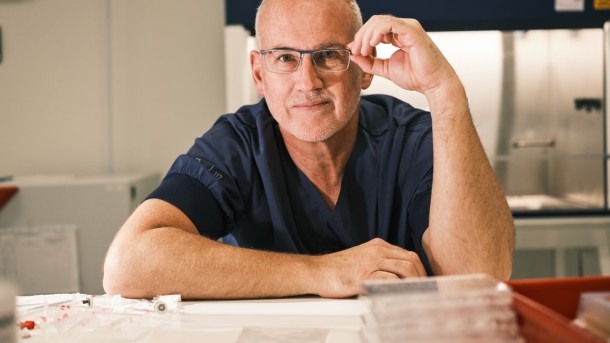Prevention
Modern medicine is increasingly transitioning towards preventive care. This shift towards prevention has also been observed in breast cancer care in recent years, particularly with the discovery of the BRCA gene. Subsequently, multiple genes and risk factors have been identified. Depending on these factors, a personalized screening strategy can be chosen. Therefore, it is crucial to understand these genetic and risk factors.
Diagnosis
I was diagnosed with cancer ... This website serves as a portal designed to assist you and your loved ones in accessing personal information and finding solutions to your concerns.
The primary goal of this website is to offer guidance and support to patients as they navigate their journey toward recovery and improved quality of life. The "Diagnosis" section of our website is divided into two main categories. Firstly, under "Anatomy and Physiology," we provide fundamental knowledge about the breast. Secondly, in the "Tumors and Disorders" section, we delve deeper into various breast-related conditions.
Moreover, we aim to provide information to women who may be concerned about potential breast issues but are hesitant to seek immediate medical advice. Knowledge and information can often offer immediate reassurance if a woman is able to identify the issue herself and determine that no specific treatment is necessary. Conversely, we also strive to educate women who have received a diagnosis of a serious breast condition, such as breast cancer, and wish to approach their doctor well-informed and prepared.
Treatment
The treatment for breast cancer should immediately include a discussion about reconstruction. Our foundation has no greater goal than to raise awareness of this among patients and oncological surgeons. By making an informed decision beforehand, we avoid closing off options for later reconstruction while still considering the oncological aspect. Of course, survival is paramount, and the decision of the oncologic surgeon will always take precedence.
The "Reconstruction or not?" page contains all the information you can expect during an initial consultation before undergoing tumor removal. This page is comprehensive, and your plastic surgeon will only provide information relevant to your situation.
"Removing the tumor" details the surgical procedure itself. This is the most crucial operation because effective tumor removal remains paramount. We guide you through the various methods of removal, a decision often made by a multidisciplinary team comprising oncologists, radiologists, pathologists, radiotherapists, breast nurses, gynecologists, oncological surgeons, and plastic surgeons.
The "Breast Reconstruction" section includes information and illustrations of the different reconstruction options along with corresponding steps.
Revalidation
Those treated for cancer often need a long period to recover.
Cancer is a radical illness with a heavy treatment. Often, people have to deal with psychosocial and/or physical problems afterwards, such as stress, anxiety, extreme fatigue, painful joints, reduced fitness, lymphedema... This can have a major impact on general well-being.
There are rehabilitation programmes offered by most hospitals. We cover some of the major topics here.
Quality of life
Quality of life is a key factor in coping with breast cancer. Therefore, it is important to find coping mechanisms that work, which will be different from patient to patient. For some, it may be finding enjoyment in activities they engaged in prior to diagnosis, taking time for appreciating life and expressing gratitude, volunteering, physical exercise... Of prime importance, studies have shown that accepting the disease as a part of one’s life is a key to effective coping, as well as focusing on mental strength to allow the patient to move on with life. In this section we are addressing some topics that patients experience during and after treatment and we are providing information to address them.
Innovation in Breast Reconstruction: Injectable Breast Implants
24 October 2024 in NewsInjectable Breast Implants Co-Developed by Professor Phillip Blondeel
With this groundbreaking technology, Professor Phillip Blondeel aims to assist breast cancer patients who undergo breast reconstruction each year. In Belgium, this involves approximately 1,500 to 2,000 women annually who have lost a breast due to cancer or preventive mastectomy because of hereditary factors. Professor Blondeel, a world authority in breast reconstruction, has developed an innovative alternative to traditional silicone implants in collaboration with chemists from UZ Gent.

Professor Phillip Blondeel discusses a promising innovation: injectable breast implants.
Their technology, developed in collaboration with top surgeons and researchers from UZ Gent, utilizes stem cells and tissue engineering to reconstruct breasts. This groundbreaking step offers hope for women who have lost a breast due to cancer or preventive mastectomy.
This new approach provides hope for the 1,500 to 2,000 Belgian women who undergo breast reconstruction each year. "We can help many breast cancer patients," says Professor Blondeel.
With this pioneering technique, prof. Blondeel aims to bring a commercial product to market within five years.
The injectable implant is based on stem cells and tissue engineering. It consists of a biodegradable pouch that acts as an "incubator" for stem cells. These stem cells recognize the substances in the gelatin of the pouch, allowing them to attach quickly to other cells and form tissue. This new tissue grows within the patient’s breast while the pouch gradually dissolves in the body. The biodegradable pouches stimulate the growth of healthy breast tissue and could represent a significant change in the world of breast reconstruction in the future. The technology not only provides a more natural result but also offers a sustainable alternative to traditional methods.
Stay updated on these exciting developments through our website and social media, and discover how 4Tissue is setting a new standard in breast reconstruction.
Newsletter

